________________
YASNA XLVI.
139
at all (approach him, which may) keep him back from misery. (And let this happen as I speak) from (vengeful) hate, O Lord!
9. But who is the freely helping one who will teach me foremost how we may adore Thee, Thou the well to be invoked 2 as in Thy deeds, the holy), bountiful Ahura ? What (words) the Kine's creator + spake for Thee by aid of, and to aid, the Righteous ritual Order, these words of Thine, (Thy people coming) with Thy Good Mind, are seeking • now (to gain and learn from) me , O Mazda Lord !
sense, falls into confusion. The ancient scholars, like some of their successors, could not always believe that pâ could mean 'to hold back from good' as well as from evil. They recognised it sometimes, giving us our instruction on the subject, but not here.
Did the composer appeal to some powerful coadjutor here, or does he rhetorically express his perplexity?
? Zevîstîm must equal forms of hû; but from the constant evidence of the Pahlavi to the meaning 'endearing,' one is much inclined to suggest a reading as if from zush.
8 Ashavanem is applied to Ahura, and cannot so well mean righteous' here. Holy' is the more proper term in this connection, while spentem is necessarily excluded from that meaning by its occurrence with ashavanem in immediate connection.
• Notice that the word tashâ occurs here with no mention of wounding in the connection (see note 6 on page 6).
I am here recalled to the Pahlavi by some who rarely name it. I had rendered, 'these words are inciting me (in duty) through Thy Good Mind ;' so ish often in the Veda. The Pahlavi translator, like his successors, scandalised at the difficult forms, also anticipated his successors (as elsewhere often) in getting free from the difficulty. He did what is exactly equivalent to what is now practised by scholars (sometimes too often). He rendered the text as if changed from what he could not understand to what he could understand, adhering to the right roots however, which I now follow. He knew that ishenti mâ did not mean, I am seeking,' but he could not credit the words before him.
o We have now a suggestion which must often have presented itself to those who read the Rig-veda constantly, and that is (so
Digitized by
Digitized by Google




